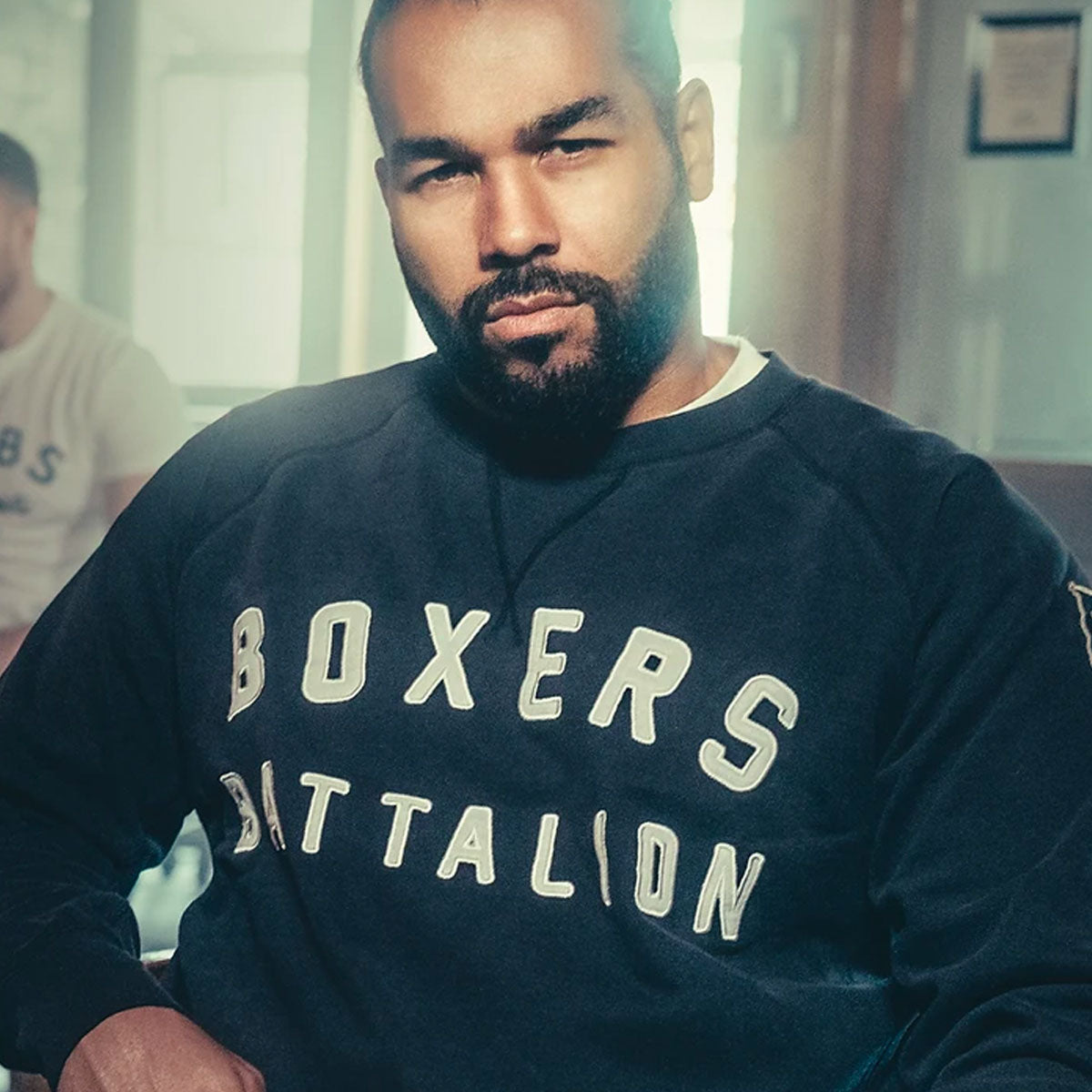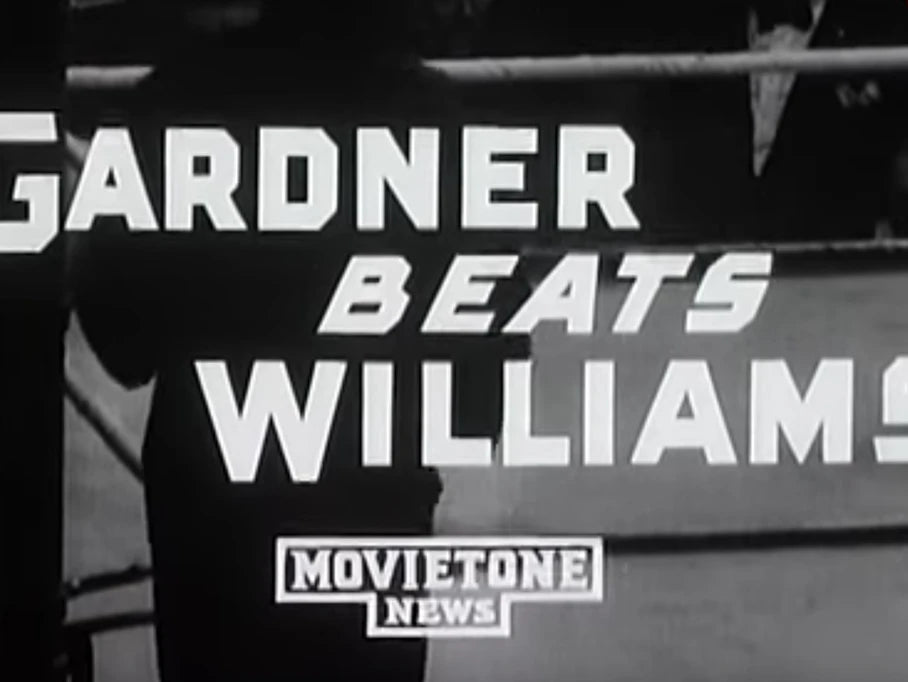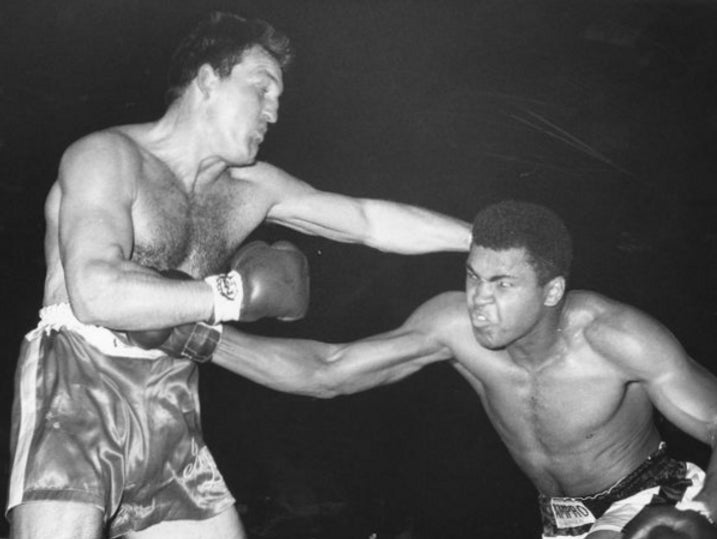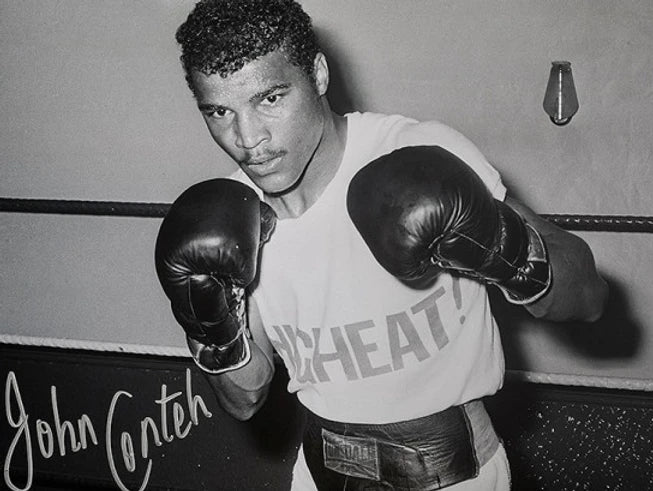Contributed by sportswriter Paul Zanon
Often referred to as ‘film star handsome’, with his impeccable taste for fine clothing, faultless hair and designer moustache, Jack Leonard Gardner was often compared to Errol Flynn.
The 6ft1 inch hammer fisted fighter was born on 6 November 1926 in Market Harborough, a small town rumoured to have been founded by the Saxons over 1,000 years ago. At the time of Gardner’s birth, the population numbered less than 10,000 inhabitants.
His father Len, a farmer by trade, trained Jack in the noble art, but it was during his time in the British army where he dedicated himself to the pugilistic discipline. Gardner served for six years (1945-1951) as a Grenadier Guard, earning the rank of colour sergeant by 1948. The very same year he carved a name for himself as one of Britain’s most promising amateur boxers, winning the ABA heavyweight title and the Army and Imperial Services titles. He also competed in the 1948 Olympics in London, where he reached the quarter finals in the heavyweight division, losing to Switzerland’s Hans Mueller. 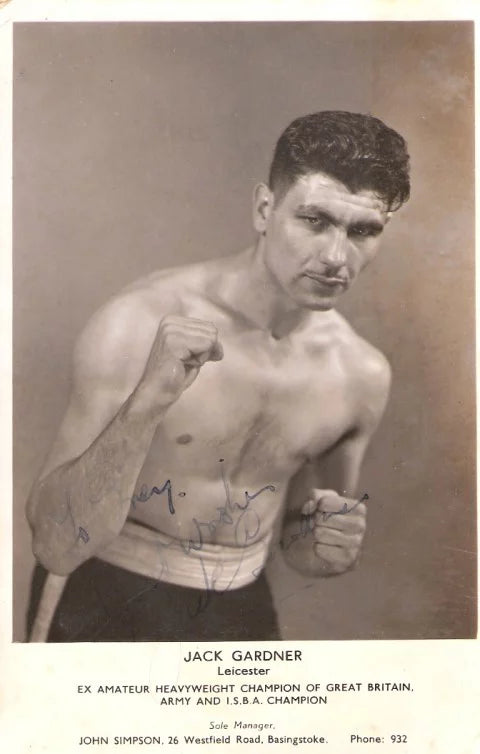
Hat-trick of fights in one night
Shortly after the Olympics, Gardner made his professional debut on 6 December 1948 at the Harringay Arena. However, this was no ordinary entrance into boxing. Take a closer look at his record and you’ll soon realise that he fought three times in one night. Taking part in a novice tournament, Gardner won all three fights via first round stoppage, which soon gained him the worthy reputation of being one of the hardest punchers in the British heavyweight division.
Within 11 months of his debut, Gardner had fought 19 times, with only one of his opponents lasting the distance. His only loss at that point came against Canadian Vern Escoe, due to a cut. In fact, of Gardner’s six professional losses, his only stoppages were caused by cuts. He was never knocked out.
After 21 fights, on 17 July 1950 Gardner was pitted against Rugby resident, Johnny Williams at the Granby Halls, Leicester. The contest acted as a final eliminator for the British heavyweight title and was named Fight of The Year for 1950. It was later called, ‘The Bloodbath of The Midlands,’ as both men fought their guts out over 12 gruelling rounds and had to spend a night in hospital afterwards.
Higher ranking than ‘The Rock’
Gardner won a points decision which saw his stock rise dramatically. His world ranking at that point was higher than a certain Rocco Francis Marchegiano, better known on the professional boxing circuit as Rocky Marciano. Alas, Gardner would never challenge for world honours.
Four months later, on 14 November 1950, Gardner was up against Doncaster’s Bruce Woodcock at the Earls Court Arena, Kensington, challenging him for his British and Commonwealth heavyweight titles. In his last two fights Woodcock had beaten Freddie Mills to become British, Commonwealth and European heavyweight champion and had fallen short against the Minnesota wrecking machine, Lee Savold, for the world heavyweight crown.
However, against the odds Gardner proved to be too much for Woodcock, forcing him to retire at the end of the eleventh session and in doing so, ending his five year reign as British heavyweight champion. On his return to Market Harborough, with the Pathe cameras rolling, the army hosted a
celebration dinner for Gardner, which included a special visit from a certain Princess Elizabeth, now the English monarch.
Four months later, on 27 March 1951, Gardner raised the bar, taking on the European heavyweight champion, Austrian Jo Weidin at the Earls Court Empress Hall, Kensington. Impressing the crowd with a decisive points victory, Gardner looked like he was on course for a world title shot.
Over the next 12 months, Market Harborough’s favourite fighting son unfortunately lost three essential fights back to back, all on points. The first was intended as a stepping stone to challenge for world honours, taking on Argentine Cesar Brion, who had lasted the distance with the great Joe Louis seven months prior.
Next up was German, Hein Ten Hoff, who walked away with Gardner’s European strap and finally, his old nemesis, Johnny Williams beat him over 15 rounds, stripping him of his British and Commonwealth titles. Many believed Gardner had done enough to win the fight, with Boxing News producing a headline of, ‘Williams Sneaks Heavyweight Crown,’ and a sub-title of, ‘Gardner made the fight, but lost the verdict.’ Understandably, Gardner was deflated and retired. 
Following in the footsteps of his father, he bought a farm, but it soon became evident that cashflow wasn’t covering the bills. Consequently, he took on a number of jobs to provide for his wife and children, including working as a car salesman and lorry driver. In the end, he made a return to the square ring.
Ring return
Almost two years after his last fight, on 8 December 1953 he took on Uber Bacilieri at the Harringay Arena. After stopping the Italian in seven rounds, he racked up three further victories, before having the rubber match against Johnny Williams on 6 June 1955 at the Ice Rink, Nottingham. The fight acted as a final eliminator for the British and Commonwealth heavyweight titles, with the winner fighting the holder of the belts, Don Cockell.
With a host of British heavyweights watching ringside, including the ‘Tonypandy Terror’, Tommy Farr, Gardner floored Williams with a massive left hook in the second session. Fortunately for Williams, the bell sounded for the end of the round at the moment the punch landed and a count was not given. Gardner did however floor him with the same punch in the fourth round and then repeated the act in the fifth. A gutsy Williams rose from the knockdown, as Gardner hunted and pounded him to the canvas with a straight right. Despite a valiant attempt to rise once again, the referee thankfully called the contest to a halt. 
Cockell versus Gardner unfortunately never came to fruition, which was a real shame as the two would have locked horns in an inevitable barnburner. As the holder of the British and Commonwealth straps, Cockell’s last three fights (all losses), from 16 May 1955 – 24 April 1956, were against stiff opposition from foreign nationals, namely Rocky Marciano (for the world heavyweight title), Cuban Nino Valdes and Tongan Kitione Lave. In essence, he didn’t need to defend his domestic titles in these contests, but still remained champion.
After beating Williams, Gardner also fought Lave, beating him on points, but lost his last fight by TKO due to cuts, against Joe Bygraves. He retired due to injury after this fight, at the age of 29. In fact, Cockell and Gardner’s swansongs were on the same night and venue. As far as the British heavyweight title was concerned, four months after Cockell and Gardner’s respective retirements, Joe Erskine and Johnny Williams battled it out for the vacant British strap (Erskine won on points).
With 23 knockouts in 28 victories and only six losses, on 11 November 1978 guardsman Gardner passed away at the young age of 52 from a brain tumour. He was cremated and his ashes were poignantly scattered under a Grenadier apple tree on his farm.
A sports hall was named after him, and in 2018 Market Harborough commemorated his life with a green plaque for his decorated services to boxing. The legend lives on.
Paul Zanon, has had nine books published, with almost all of them reaching the No1 Bestselling spot in their respective categories on Amazon. He has co-hosted boxing shows on Talk Sport, been a pundit on London Live, Boxnation and has contributed to a number of boxing publications, including, Boxing Monthly, The Ring, Daily Sport, Boxing News, Boxing Social, amongst other publications.



